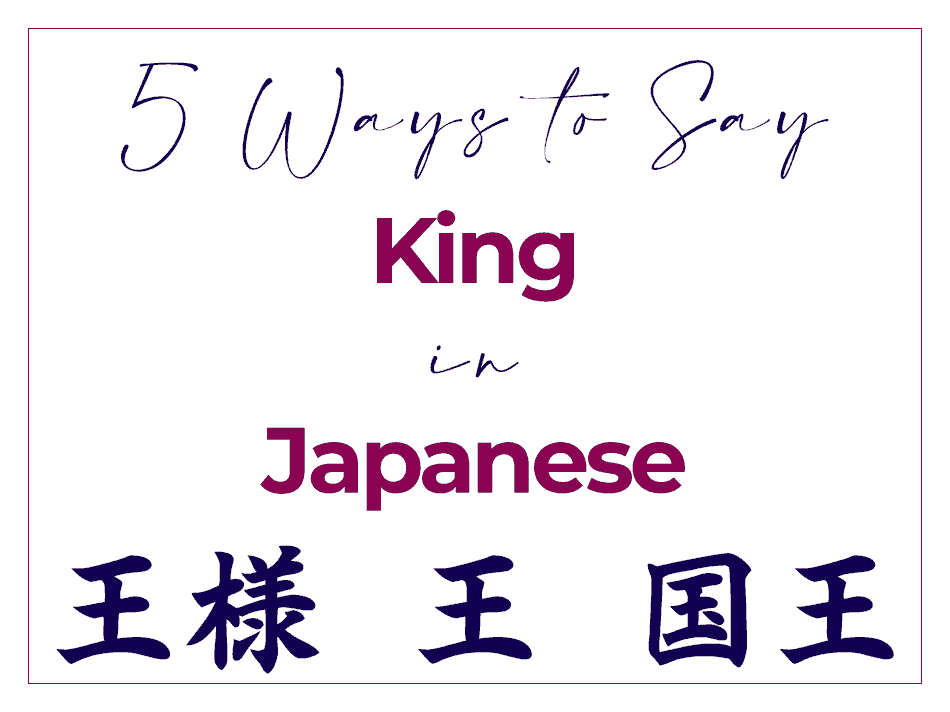I have written this blog post for all of you who want to know how to say “king” in Japanese. There are 5 Japanese words that are typically used when talking about or referring to a or the “king“. I will give you all the details including, kanji, the English translation, as well as any other meanings of each words.
The word for “king” in Japanese is “ou” and its written with the kanji “王”. However, more commonly its politer and more respectful version ousama (王様) is used when talking about or to a king. When formally addressing the king the word heika (陛下) meaning “His Majesty” is more appropriate, though.
Read on, if you want to know all 5 commonly used words for “king” in Japanese and when to use them. After that, we will take a closer look at the Japanese kanji for “king” and you will learn how to properly address a sovereign and non-sovereign king in Japanese.
How to Say “King” in Japanese
- ou – 王
- ousama – 王様
- kokuou – 国王
- ouja – 王者
- kingu – キング
1. Ou – Basic Japanese Word and Kanji for “King”
Ou (王, おう) is the basic word and kanji for “king” in Japanese, but it can also be translated as “ruler“, “sovereign“, or “monarch“. Due to its rudimentary sound it is more commonly used to talk about the topic “kings” or the concept of (having) a king in general. It’s not used to adress a king.
Sometimes the word ou (王) can also be used to refer to a successful person or a winner and be translated a “tycoon“, “master“, or “champion“.
ou
王
king
ruler
sovereign
monarch
2. Ousama – Polite Way to Say “King” in Japanese
Ousama (王様) is a politer way to say “king” in Japanese. It’s the basic Japanese word and kanji for king (王) combinded with the honorific suffix sama (様), which is attached to add politeness and respect. This is the most commonly used Japanese word when talking about a king and often heard in anime.
ousama
王様
king (polite)
3. Kokuou – Translates as “King”, “Monarch”, or “the Crown”
Another common word for “king” in Japanese is kokuou (国王). It doesn’t only translate as “king”, but “monarch“, “sovereign“, or “the Crown” and can also be used for a “queen“, since it is used for the ruler of a country. The word is originally from China where it was used to refer to local lords.
Probably due to its connotation with China it is a little less popular and less commonly used than the native Japanese words ou (王) and ousama (王様).
kokuou
国王
king
queen
monarch
sovereign
the Crown
4. Ouja – Means “King”, “Monarch”, “Ruler”, or “Champion”
The word ouja (王者) translates as “king“, “monarch“, “ruler“, and “champion“. While it also translates as “king” the word usually means “champion” and is used for a person who won a sporting contest or any other kind of competition. The second kanji 者 basically just means “someone” or “person“.
ouja
王者
king
monarch
ruler
champion
5. Kingu – English Loanword for “King”
Kingu (キング) is an English loanword that is sometimes used to say “king” in Japanese. However, it ist most commonly used for the titels of anime, manga, movies, and games. Sometimes it is also used in animal names such as king cobra (kingu kobura, キングコブラ) and king penguin (kingu pengin, キングペンギン).
kingu
キング
king
The Japanese Kanji for “King”
The Japanese kanji for “king” is 王. It is usually read as ou (おう), but sometimes when it appears at the end of a word it can also be read as nou (のう) like in shinnou (親王) meaning “prince of royal blood” or kinnou (勤王) meaning “loyalty to the emperor“. Its other meanings are “rule” and “magnate“.
王
king, rule, magnate
4 strokes
音読み:オウ、-ノウ
訓読み:–
onyomi: ou, -nou
kunyomi: –
Some of the most common and useful Japanese words with the kanji for king are:
ou
王
kingousama
王様
king (polite)
jouou
女王
queen
ouji
王子
prince
oujo
王女
princess
oui
王位
the throne
the crownouza
王座
throne
I anime and manga you might encounter the words:
ryuuou
竜王
dragon king
the Dragon King
Read more » 3 Ways to Say “Dragon” in Japanese
kaizokuou
海賊王
pirate king
the Pirate King
maou
魔王
demon king
the Demon king
the Devil, Satan
Read more » 5 Ways to Say “Demon” in Japanese
How to Address a King in Japanese
The title Heika (陛下) is used to formally address a sovereign king or queen in Japanese. It translates as “Your Majesty“, “His Majesty” or “Her Majesty” and can be used by itself or as a suffix: Kokuou Heika (国王陛下) means “His Majesty the King” and Joou Heika (女王陛下) means “Her Majesty the Queen“.
Formal way to address “Your Majesty” in Japanese:
Heika
陛下
Your Majesty
His Majesty
Her Majesty
Using Heika (陛下) as a suffix to specifically address a king, queen, or the emperor in Japanese:
Kokuou Heika
国王陛下
His Majesty the KingJoou Heika
女王陛下
His Majesty the QueenTennou Heika
天皇陛下
His Majesty the Emperor
If you listen closely, you can hear Ardyn Izunia use the word Heika (陛下) in the Japanese trailer for the movie “Kingsglaive: Final Fantasy XV“. He says it at 0:06 and and at 0:10. The first time he usues it as a suffix saying Regisu Kokuou Heika (レギス国王陛下) which translates as “Her Majesty King Regis“, while the second time he uses just the word Heika (陛下).
For a non-sovereign monarch or ruler, the title or suffix Denka (殿下) is used instead. It translates as “Your Highness“, “His Highness“, or “Her Highness” and just like Heika (陛下) it can be used by itself or as a suffix.
Denka
殿下
Your Highness
His Highness
Her Highness


